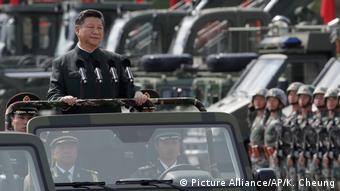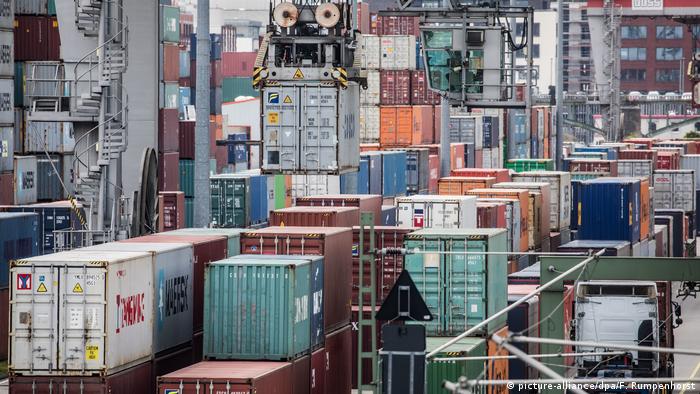In Hamburg, the G20 summit is being held from Friday. Five Asian countries are represented, but none of them uses the Forum as intense as that of China. Because the G20 is an important component of China’s geopolitical ambitions.

Since China’s President Xi Jinping in office, China has strengthened its foreign policy commitment. He launched the new silk road Initiative and let the Asian infrastructure investment Bank (AIIB). In 2017, Xi called on the World Economic Forum in Davos, free trade, and later he joined chosen for the Paris climate agreement. But also the self-conscious military emergence of China in the East and South China sea has, in the same direction: China wants more international influence.
In this context, the G20 has played an important role. 2016 China hosted the G20 summit in Hangzhou. As the host, Beijing had the right to determine the Agenda to a large extent. China came in at that time for globalisation, global free trade and climate protection.

Xi on the military parade in Hong Kong at the end of June
The strengthening of the G20, without the Expansion of the Agenda
Long-call on China, the G20, which had experienced in response to the world financial crisis starting in 2007, a growth in the importance, to transform an Instrument for the long-term global economic planning, write to Heike Holbig and Sebastian Biba in a recent study by the Hamburg-based GIGA Institute for Asian studies, on China’s role in the G20. China put on a better global macro-economic coordination, the promotion of an open world trade and reforms of the international financial system. All of these objectives are in the interest of the second largest economy in the world, which is heavily dependent on the Export of, and trade in, the authors wrote.
However, “China has little interest in the Agenda of the G20 to develop”, judge Holbig and Biba. Neither in terms of topics nor in terms of number of members. As France continued at the G20 summit in 2011, topics such as global health, labor, and agricultural production on the Agenda, China was strongly opposed, so Holbig and Biba. “Furthermore, the Chinese leadership is sensitive and controversial topics such as global security and (Geo)politics at the UN, where China, as a permanent member of the security Council, the Veto can be inserted.”
No legitimacy at the expense of efficiency
Against the G20 is often led into the field, that they contravened the international legal principle of cooperation. It was an exclusive Club, the decisions, the countries of concern, which were not included in the decision-making process, the critics of globalisation. The legitimacy deficit could be offset if the participation subject to democratic criteria, other emerging countries and the decisions more transparent. However, the larger the Club, the less prestigious the membership; and, the more transparent and rule-based, the Forum, the less room for flexible problem solving.
Both of which don’t want China. It is precisely the informal character of the G20, for China is a crucial plus point. “Should be tackled, the legitimacy deficit of the G20, in fact, could lead to China’s withdrawal”, in order to conclude Hobig and Biba. China would then focus more on their own initiatives like New Development Bank of BRICS countries, or AIIB.

G20: free-trade and climate protection the main topics are
New World Order?
China believes that its interests in the circle of the G20 in its current Form is the best to prevail, because “in the Format of the G20, it can negotiate with the developed countries, the United States, but also of the European Union, at eye level,” says Enrico Fels, from the centre for global studies at the University of Bonn. And: “The other members know that it is without China there is no global economic and financial governance.”
The situation is different in the context of the so-called Bretton Woods institutions such as the International monetary Fund or the world Bank, where China, in spite of the voice reform of 2010, is under-represented. Currently, the voting rights in the world Bank, distributed as follows: United States of 15.85, Japan 6,84, PRC 4,42 and Germany 4 percent. Rock’ judgment is clear: “China is a disadvantaged player. It is the voice not has shares, which correspond to its political, economic and financial weight.”
In the long term China targets, an international System that is not dominated by the Western industrial Nations, believes the Rock. “It’s an Alternative to the Bretton-Woods-System, in which multi-polarity is possible, where more and more Emerging and developing countries in the decision-making process are not involved.”

Enrico Fels of the University of Bonn
Still a long way for China
With the inauguration of U.S. President Donald Trump such a transformation of the international order seems more likely ever. From the USA insulation are reinforced to hear ballistic sounds. And the US-American foreign policy, driving a zigzag course. Confidence in the U.S. as a leading power is waning in the world. China take the opportunity to raise its international profile. “I think China has shown with the recent initiatives, that it is ready to take on a leadership role,” says Rock. “But the point is: Who wants to lead, needs actors who follow him. So the question is, whether the countries of the G20 and, in addition, are ready to follow China. And I don’t see it yet.”
The USA remains an attractive model and an extensive political and economic cooperation network, both in the Asia-Pacific region as well as in Europe and around the world. In addition, China needs to make to be honest. It call to the free world trade, Sagittarius, but at the same time, the domestic market, and the state of their own companies from competition from abroad. A global economic order could not build on double Standards.